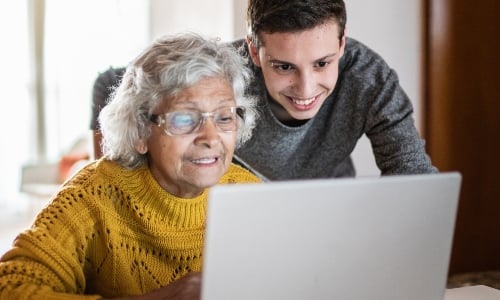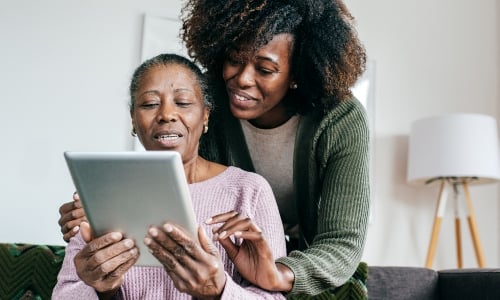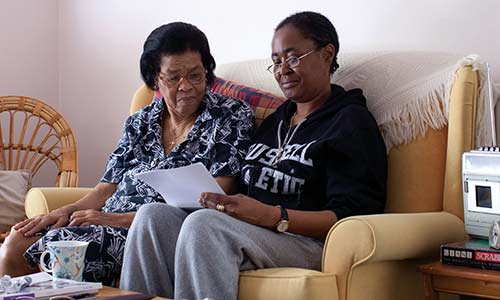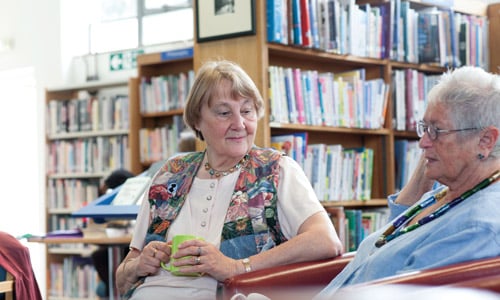How would you feel if the things you enjoyed doing and needed for your wellbeing were put out of your reach?
If the tried and tested methods you’d always used were made obsolete, seemingly overnight?
That’s how Diane felt when she became digitally excluded through no fault of her own. A vibrant woman who’s passionate about travel and socialising, Diane was suddenly unable to do what was once accessible to her, like enquiring about services she saw advertised on the television, or checking the film listings at her local cinema.
Many things are internet only and I find little sympathy or understanding of my difficulties.
The disappearance of offline access
In 2019, Diane’s failing eyesight left her unable to use a computer anymore. Though Diane is the first to admit to not being particularly adept with technology, instead excelling with numbers having worked in financial planning for many years, she nevertheless found having online access to be helpful. She soon felt the repercussions of no longer having it, at a time when businesses and organisations had started to cater for online only, accelerated by the arrival of the COVID-19 pandemic.
Like many of us, Diane had assumed that when the restrictions of the pandemic ended, the availability of ‘offline’ options like the phone and post would return to normal. This wasn’t to be the case, though, and Diane’s increasing feelings of exclusion soon took a toll on her physical and mental health.
In an article written for a local Age UK in 2022, Diane reflected upon the situation for the 1 in 3 people over 65 without digital access: ‘My life is being squeezed into smaller and smaller areas. Many things are internet only and I find little sympathy or understanding of my difficulties. I am not alone in my situation. And while some can be helped by training and support, for many people like me, this is simply not possible due to health issues e.g. sight, dexterity and dementia’.
Given Diane's frustration, the local Age UK asked her if she’d heard of the Equality Advisory And Support Service. “The Equality Act 2010 calls for equal treatment for people with disabilities, and for reasonable adjustments for everybody in the entire country – whether it’s public, private or charities,” Diane says of what she learned. “To help people who otherwise would not be able to use the services or the company. The Equality Advisory and Support Service is the arbitration service that deals with the Equality Act 2010.”
Armed with this information, Diane began to act, identifying a number of companies – from banks to supermarkets – that don’t include a contact number in their advertising. “Next time you’ve got the television on, have a pad and pen next to you and write down how many organisations, companies and charities are only accessible by email or webpage,” explains Diane. “And all of them are breaking the law, because the Equality Act requires reasonable adjustments.”
I thought, ‘Who is making my life better out of every organisation I know?’ There’s only one candidate, Age UK. I have found them to help in every conceivable way.
Pushing for change
Diane has been aware of the work of Age UK for several years. She retired early in order to look after her mother, then later, her father. After her father’s death, Diane made contact with her local Age UK, Age UK Westminster, and was thrilled to discover a schedule packed with activities that appealed to her. “If you look at what [Age UK Westminster] do, week in, week out, it’s incredible,” praises Diane. “They run coffee mornings, afternoon teas, gardening clubs, IT clubs, dementia cafes. Christmas lunches, all that kind of stuff.”
Having established that relationship, with the arrival of the pandemic, Diane appreciated there being someone to reach out to her. “I needed people. I needed to talk to people. And then my now telephone friend Steve phoned me and said, ‘Would you like me to phone you regularly, just for a chat?’ And that’s exactly what I needed to hear.”
Given the support Age UK has provided, and how strongly she feels about digital exclusion, it was natural that Diane would lend her voice to Age UK’s work around the topic. “The only people in the country that are taking this [topic] seriously are Age UK,” says Diane. “They’re doing all manner of things.”
In addition to writing an article about her personal experiences of digital exclusion, Diane has added her voice to Age UK’s work on the subject. “Age UK are doing two things I bless them for every day,” Diane says of why she’s become involved with our campaigning work. “They are backing a call for the establishment of a Commissioner for Older People and Ageing, who would look at the problem of digital exclusion. They’re also circulating a petition about digital exclusion, asking that there should always be an offline contact for all public authorities, as well as an online contact.”
Not only did Diane manage to get more than 150 signatures for the petition, but in conjunction with Age UK’s Media team, she’s been interviewed by The Times, The Telegraph, The Daily Mirror and Channel 4 News. And she remains forthright about the importance of being proactive for causes that matter. “When I talk to people about digital exclusion, they say, ‘Yeah, that's what my nan, neighbour or friend says.’ And I say, ‘Well, what are you doing about it?” And they're not usually doing anything except mumbling in their beer. Well, as you may have gathered, I don't mumble in my beer – I do something!”
The difference Age UK has made inspired Diane to make monthly donations to the charity and, more recently, to leave Age UK a gift in her will. “My solicitor was coming over to do a couple of things with my affairs and I decided to look at my will with her,” explains Diane. “I thought, ‘Who is making my life better out of every organisation I know?’ There’s only one candidate, Age UK. I have found them to help in every conceivable way. That's why I'm so, so grateful to them. And I want to show my gratitude in a tangible form.”
*Names and images have been changed to protect individual's privacy.
Everyone should have fair and equal access to services
Age UK is campaigning to make sure everyone can access the services they need - so that being offline doesn't mean being overlooked.






